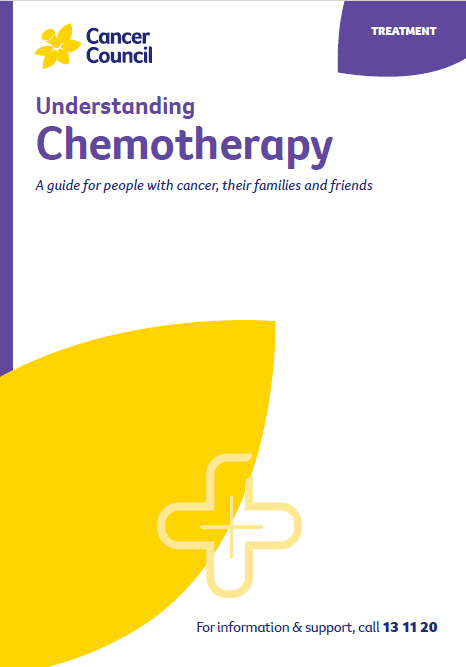- Home
- About Cancer
- Cancer treatment
- Chemotherapy
- Life after chemotherapy
Life after chemotherapy
For most people, the cancer experience doesn’t end on the last day of treatment. Life after cancer treatment can present its own challenges. You may have mixed feelings when treatment ends, and worry that every ache and pain means the cancer is coming back.
Learn more about:
Overview
Some people say that they feel pressure to return to “normal life”. It is important to allow yourself time to adjust to the physical and emotional changes, and establish a new daily routine at your own pace. Your family and friends may also need time to adjust.
Cancer Council 13 11 20 can help you connect with other people who have had chemotherapy, and provide you with information about the emotional and practical aspects of living well after cancer.
For more on this, see Living well after cancer.
Follow-up appointments
After chemotherapy ends, you will have regular appointments with your oncologist or haematologist to monitor your health, manage any long-term side effects, and to check that the cancer hasn’t come back or spread.
During these check-ups, you will usually have a physical examination and you may have blood tests, x-rays or scans. You will also be able to discuss how you’re feeling and mention any concerns you may have.
You may also have regular check-ups with other specialists who have been involved in your treatment. If you need it, you will often receive continued support from allied health professionals, such as a physiotherapist or dietitian.
Check-ups will become less frequent if you have no further problems. Between follow-up appointments, let your doctor know immediately of any symptoms or health problems.
When a follow-up appointment or test is approaching, many people find that they think more about the cancer and may feel anxious.
Talk to your treatment team or call Cancer Council 13 11 20 if you are finding it hard to manage this anxiety.
For more on this, see Emotions and Cancer.
Dealing with feelings of sadness
If you have continued feelings of sadness, have trouble getting up in the morning or have lost motivation to do things that previously gave you pleasure, you may be experiencing depression. This is quite common among people who have had cancer.
Talk to your GP, because counselling or medication, even for a short time, may help. Some people can get a Medicare rebate for sessions with a psychologist. Cancer Council may also run a counselling program in your area.
For information about coping with depression and anxiety, call Beyond Blue on 1300 22 46 36. For 24-hour crisis support, call Lifeline 13 11 14.
The Thing About Cancer podcast
Listen to our podcast The Thing About Cancer for information and insights that can help you navigate through the challenges of living with cancer.
Looking after yourself
Cancer can cause physical and emotional strain, so it’s important to look after your wellbeing. Cancer Council has free booklets and programs to help you during and after treatment.
Call 13 11 20 to find out more, or see Managing cancer side effects, Exercise after a cancer diagnosis, Complementary therapies, Emotions and cancer, Nutrition and cancer, Sexuality, intimacy and cancer, Fertility and cancer, and Living well after cancer.
Once treatment was finished, it was quite daunting and I was fearful that the cancer would come back somewhere. Eight years later, it hasn’t come back, which is fantastic.
Pete
→ READ MORE: Personal stories from people affected by cancer
Watch this video to see why eating well is so important after a cancer diagnosis, and what you can do to maintain a healthy diet.
Research shows that exercise benefits people with cancer during and after treatment. Find out more in this video or see our other exercise videos.
More resources
A/Prof Kate Mahon, Director of Medical Oncology, Chris O’Brien Lifehouse, NSW; Katherine Bell, Dietetics Department, Liverpool Hospital, NSW; Brigitta Leben, Dietetics Department, Liverpool Hospital, NSW; Sophie Michele, 13 11 20 Consultant, Cancer Council SA; Dr Jess Smith, Medical Oncologist, Macquarie University Hospital, NSW; Karene Stewart, Consumer; Julie Teraci, Clinical Nurse Consultant, Skin Cancer and Melanoma, Cancer Network WA.
View the Cancer Council NSW editorial policy.
View all publications or call 13 11 20 for free printed copies.

